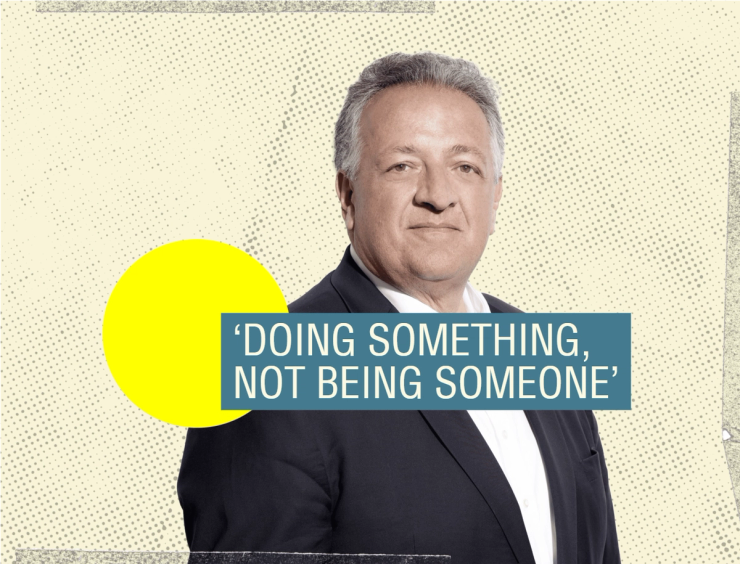The Signal Insight
Flagship Pioneering is a hard business to describe, Noubar Afeyan admits. The Boston-based group he leads is not quite a pharma company, not just a research lab, and not exactly a VC firm. Instead, he describes it as a learning ecosystem that turns “what if” questions into breakthrough innovations, which it then builds into viable businesses.
Flagship has launched 118 companies over 25 years, addressing various facets of health care and sustainability. The best-known of them is Moderna, the mRNA vaccine maker that Afeyan co-founded and still chairs, but its other companies have a record of striking deals with far larger groups, including partnerships announced this week with GSK and Saudi Arabia’s King Abdullah International Medical Research Center.
Afeyan remembers exactly how many companies Flagship Pioneering has founded because it numbers each one of them at birth. That makes them easier to close down if they don’t survive the “killer questions” it bombards them with in their early days. But if they survive, they earn a name and the chance to thrive.
Flagship employs about 600 people, more than half of whom are scientists, engineers, or medical doctors. It also has expertise in a range of functions — business development, finance, artificial intelligence, regulatory — to support dozens of companies and file hundreds of patents a year.
The keys to its record of success, Afeyan says, are an approach to finding opportunities in areas beyond the adjacent markets where established companies innovate, and a view of entrepreneurship as “doing something, not being someone.”
Here’s how he describes what Flagship does, and the conditions the Beirut-born son of Armenian parents thinks America needs for innovation to flourish.
This interview has been edited for length and clarity.
Andrew Edgecliffe-Johnson: How should we understand what Flagship Pioneering does?
Noubar Afeyan: We are an institution that creates, repeatedly, breakthrough innovations or discontinuous advances. That’s something we’ve created an engine around, which we call “pioneering” — that is, leaping beyond adjacencies to create unprecedented breakthroughs.
The second thing we’ve systematized is the conversion of breakthrough innovations into companies that can ultimately deliver value from [those innovations] to customers and investors.
That is historically viewed to be a highly idiosyncratic, low-likelihood event, and we don’t believe that. We believe that there’s a form of entrepreneurship that should be viewed as a professional act, not an amateur act, and we call that entrepreneuring. We changed the end of the word to indicate that you’re doing something, not being someone.
What do you do internally to create economies of scale? If I’m launching the next Moderna, am I sitting down with [Moderna CEO] Stéphane Bancel?
There is a massive amount of that. And Stéphane Bancel, 15 years ago, was the beneficiary of the same thing that preceded him. Stéphane joined Flagship as a senior partner and then became CEO of what was called LS18, our 18th life sciences company. We number all of our companies at birth. We bless them with the indignity of having a number. That way, we can kill them. And the ones that don’t die end up with a name.
We file [about] 700 patents a year. If you’re a CEO of one of our companies, you have [access to] all of that, plus a platform that is quite unique. Flagship, above all, is a learning ecosystem that’s trying to take the thousands of ‘what if’ questions we’ve asked that led to the hundreds of projects we started, to the 118 [companies] that have taken on a living form. They all, through the institution, contribute to the newborn.
We launch about 15 proto-companies [a year]. A proto-company, just like any prototype product, is meant to be beaten up and killed, and then if it fails to die, it becomes a company. We try to ask killer questions early, and six or seven of those [proto-companies typically] become companies a year or two later.
This is the dream of every company, to innovate repeatedly, but most established, traditional corporations struggle to do that. Why have they not copied this model?
We have long viewed innovation as being focused on adjacencies. If you draw a circle and put inside it everything that exists and is known in any given area — Alzheimer’s, cancer, or agriculture — then the concentric circle around it is the zone of adjacency, and that’s where 100% of innovation dollars go.
We only exist outside of [that] circle. Other people are busy evaluating the risk/reward tradeoffs and the likelihood of success, and we’re working on things where you cannot estimate the likelihood of success at all. Large companies don’t need to do that because they own the incumbent zone, the first circle. So everything around that zone is more naturally their domain than way out in the middle of nowhere. Whereas, as a band of insurgents, we have no business being close to shore. [Another way of looking at it] is that incumbents attack [innovation] from the present, and we attack it from the future.
How do you expect AI will change the game in medical discovery and health care?
Generative AI, modern AI, is the single most disruptive force in biomedical research in the 38 years I’ve been doing it. Seeing a computer in a lab was a big deal. Seeing the internet bring you access to just-in-time information was a big deal. None of them massively changed the cognitive capability of the human scientist. What we can do now is an expansion, an interconnection, of human minds, and it will impact all aspects of what we’re doing.
Why haven’t we seen a revaluation of the pharma and biotech industry upward, if the promise is so great?
Great promise doesn’t say anything about speed. It’s the investors that superimpose a speed expectation onto it: They control the speed dial, and entrepreneurs control the promise dial. If you’re not careful as an entrepreneur and you make it seem like it’s about to happen, which is a very big mistake, then investors will be disappointed. But if you can tell them that there’s this gigantic prize, and here are the steps along the way that indicate that you’re making progress towards it, I think that’s more sustainable. I don’t think the biotech field generally does well with that.
There’s been a major change in the regulatory atmosphere in the US in the past year. How does it affect you?
It’s a double-edged sword. On the one hand, people have made statements about vaccines, about mRNA. And that’s becoming more of a threat to science at large, as opposed to specific instances. I think in time, it will seem less focused on any one thing and more of a general malaise around the scientific process, so I don’t know that that’s something we can engage with fixing.
We have not seen, in any interaction with the regulators, a change in the standards of scientific rigor or testing rigor, at all. If anything, we’ve seen an openness to think about new ways of balancing the obligation to maintain rigor and safety of testing with the need to get drugs to come out.
You recently presented a humanitarian award at Ellis Island. What do you make of the current US politics around immigration?
I view the US as the most regenerative country that exists. It is all about generations of people coming in from outside, mixing in with those who are here. We are not named something-land, like England, Finland, Switzerland, or Ireland. If we were, we would be “Immigrantland.” And if we lose that, then we lose what it is to be this country, in my view.
That’s a grandiose statement, but it’s intended for people who dare to think that this country would keep its advantages if it closed enough of its doors. Nobody will advocate for illegal immigration, but it’s about finding ways to make sure we don’t cut off H-1B visas or other important interventions into our country’s intellectual and emotional intelligence. I’ve looked a lot at my journey, and I find that much of the innovation world is just intellectual immigration.
Immigrants have the advantage of bringing the experience of the fear, adaptability, and resilience that comes with being in a new country. You can bring that to new technologies and new ideas spaces. It’s not that you can’t do that if you’re not an immigrant. It’s that if you can’t adopt an immigrant mindset, you will have a disadvantage.
Notable
- Moderna’s Covid-19 vaccine led to a pandemic windfall, but its revenue plunged as demand for its shots fell. This week, it secured a $1.5 billion credit facility from Ares Management as it told investors it would deliver up to 10% revenue growth in 2026 while reducing R&D investments and diversifying further into oncology.


